October 23, 2023
What’s New and What’s Next for These STA Honorable Mention Cities
Each year, ITDP and the Sustainable Transport Award Committee recognize diverse global cities that have implemented innovative sustainable transportation projects in the preceding year.
Alongside the one winning city each year, the STA Committee also recognizes other dynamic applicants as Honorable Mentions for their dedication to improving transport and mobility in their respective regions. Even after their involvement in STA programming, it is important to recognize that these cities continue to embark on impressive, innovative, and forward-thinking transport initiatives and policies that aim to improve the lives of all residents. Thus, we are excited to provide updates from the 2022 STA Honorable Mentions (Peshawar, Pakistan, and Tartu, Estonia) and the 2023 STA Honorable Mentions (Bhubaneswar, India and Jalisco, Mexico) whose continued commitments to sustainable, equitable mobility should inspire governments worldwide.
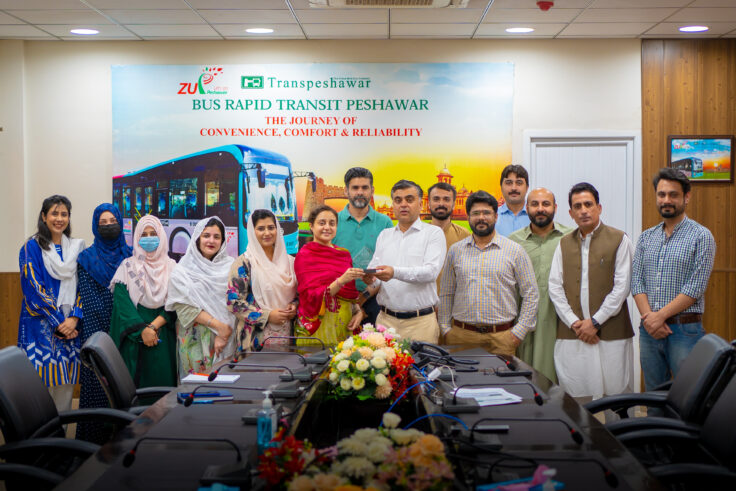
Peshawar, Pakistan — 2022 STA Honorable Mention
Since 2020, Zu Peshawar, the first Gold Standard Bus Rapid Transit (BRT) system on the Indian Peninsula, has been moving over 250,000 passengers daily, providing access to the city for women, persons with disabilities and the youth. The system’s design, centered on the needs of people who need it most, is the highlight of achievements which earned Peshawar its STA Honor. Now, the TransPeshawar authority is continuing its commitment to enhancing transport accessibility, sustainability, equity, and climate resiliency. When the Peshawar BRT was inaugurated in August 2020, the project initially started with only one trunk route on 27 kilometers of a dedicated corridor. TransPeshawar subsequently created more off-corridor routes with 86 kilometers of coverage.
Currently, the BRT system is transporting around 300,000 daily passengers with a peak day ridership of 316,353 as of January 2023. The recognition of Peshawar BRT as an Honorable Mention in the 2022 STA program provided encouragement to all of the city and local stakeholders involved in getting the project operational. The STA was the first international recognition of the city’s BRT, which has since received three more international honors — as a Finalist for Prize for Cities Award from the World Resource Institute, the Best Smart Ticketing Award by Transport Ticketing Global, and a Gold Standard BRT ranking by ITDP.
The systems has now facilitated more gender-inclusive mobility, and female ridership has increased from 2% to 30% with women’s employment ratio increased from 0% to 10%. Based on the success of the first phase, the Government of Khyber Pakhtunkhwa has initiated a feasibility study which is in the final stages of completion. The hiring of a consultant is in pipeline to prepare a preliminary design for the next phase of the project, which aims to improve additional mobility and connectivity issues. The scope of work includes the development of approximately 22 kilometers more of dedicated BRT corridors, the procurement of fully electric vehicles, and integration with e-scooters, e-bikes and improvements to pedestrian paths.
In addition, TransPeshawar is planning the installation of solar energy systems in thirty stations and one depot to convert from diesel-generated power to renewable energy, minimizing costs with a sustainable source of energy for the BRT infrastructure. This next phase of the project will increase the city’s BRT service coverage from 40% to nearly 75%. Read more about Peshawar’s approach here and watch this technical webinar for more details.
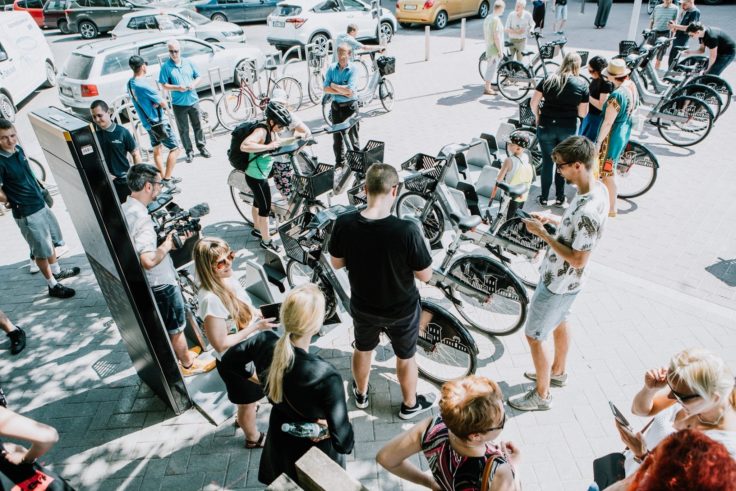
Tartu, Estonia – 2022 Honorable Mention
Since 2012, the City of Tartu, Estonia, another 2022 STA Honorable Mention, has been implementing programs, infrastructure, and policy that transformed the city into a model for sustainable, accessible mobility based on real-time data, feedback from residents, and ambitious climate targets. Currently, Tartu has begun the implementation of a citywide energy and climate plan known as Tartu Energy 2030 (SECAP), which was adopted in early 2021. In the area of mobility, the main points of action within the plan are improvements to traffic managements on roads and the improvement of public transport services that link the city with peripheral areas. These services will focus on low-carbon and non-motorized transport options. Tartu is also working on creating safer conditions for bicycle and pedestrian traffic, with an extensive bicycle path network development initiative being prepared for 2024-2026 that will establish a framework for the city.
At the same time, Tartu is implementing mobility centers and hubs around the border of the city with the aim of offering everyday commuters more accessible, affordable, and convenient opportunities to choose sustainable mobility for intra-city commutes, rather than driving. The first mobility center will be designed at the Lõunakeskus, the city’s largest shopping area and commercial corridor on the border of of the city. To further improve the quality of public transport connections and better connect the city and nearby areas, a comprehensive network of city bus lines is also in development to serve peripheral and suburban communities to facilitate more connected public transport service that can reduce congestion and vehicle emissions. Watch this technical webinar to learn more about Tartu’s strategies.
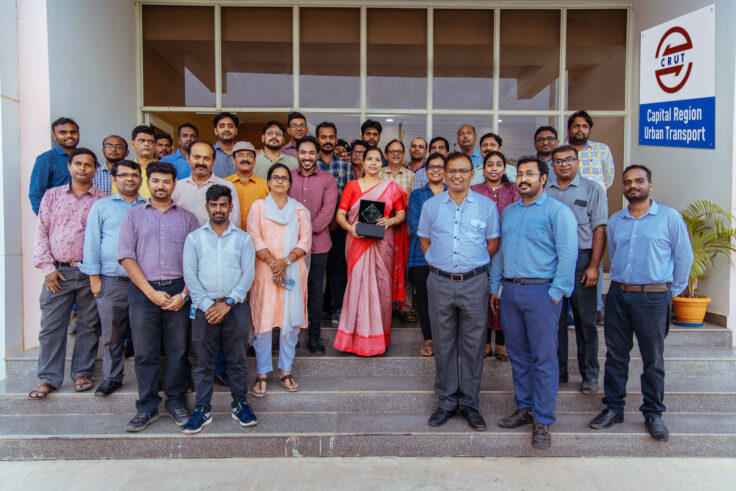
Bhubaneswar, India – 2023 STA Honorable Mention
The City of Bhubaneswar, India has been a major mover in green and equitable urban mobility since it debuted its Mo Bus city bus service in 2018 and modernized its e-rickshaw feeder service known as Mo E-Ride. The region’s Capital Region Urban Transport (CRUT) authority has been steadily working to redefine urban mobility in the State of Odisha by enhancing sustainable and gender inclusive mobility.
In 2023, CRUT expanded Mo Bus services to the nearby city of Rourkela and surrounding areas, making public bus service the backbone of local transport. With a focus on hiring women, transgender, and HIV+ individuals as operators for Mo E-Ride’s fleet of 50 e-rickshaws has also contributed to safety and more empowered ridership. With smart and electric technologies, Mo E-Ride offers sustainable and secure last-mile connectivity to areas not traditionally served by bus routes.
Throughout the past year, CRUT continues to invest in enhancing electric bus services in four Odisha cities — Bhubaneswar, Cuttack, Berhampur and Rourkela. The State has received approval for the acquisition of 350 e-buses, with a proposal submitted to the national Government for final approval. Notably, 100 buses each will be deployed in Bhubaneswar and Cuttack, which will help reduce emissions and improve rider experience.
CRUT is also doubling down on its gender-inclusive hiring practices, with 40% of Mo Bus staff members being women. The agency has also committed increasing in the number of women Sarathis (operators/drivers) for the Mo E-Ride services. CRUT has established driver training programs in four locations throughout Odisha, targeting at least 300 individuals from underserved communities, particularly women and gender non-conforming individuals.
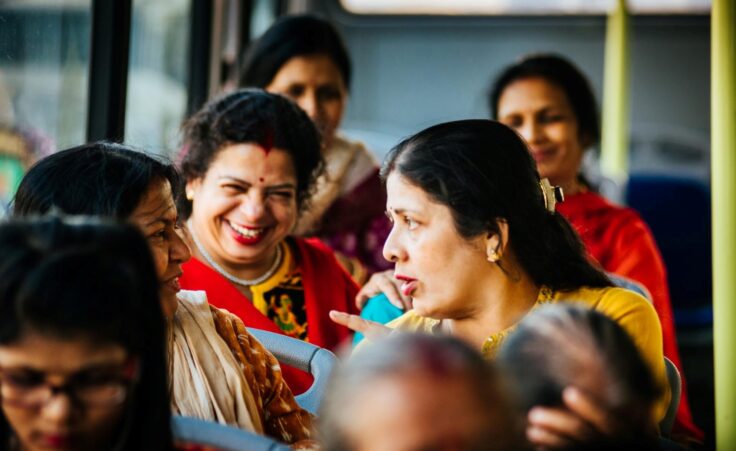
A continued investment in electric vehicles is also key to CRUT’s current plans, with a planned expansion of its Mo E-Ride fleet with an additional 500 vehicles. Odisha has been selected by the national Government to procure over 500 Mo E-Rides to serve the cities of Bhubaneswar, Cuttack, and Puri. The use of new technologies and payment systems is also an area where CRUT is looking to grow. As an integral part of providing efficient transport services, multiple bus depots are under development across cities in Odisha, including one exclusively for electric vehicles in Bhubaneswar. The depots highlight green building technologies and are focused on state-of-the-art technologies.
The agency is also employing Intelligent Transport System services to help streamline and enhance operations and scheduling, including the use of Automatic Vehicle Locators, Vehicle Battery Management Systems, and Smart Planning and Dispatch tools. As digital ticketing platforms have been surging in popularity, CRUT is utilizing them to gather data on ridership, optimize operations, and improve overall experience. CRUT was also the first public transport system in India to implement disaggregated ticketing services.
To further ease vehicle boarding and fare collection, Mo Bus recently procured electronic ticketing machines to enable digital wireless payments with a Mo Bus card that will save time and hassle for passengers by allowing tap-and-pay, alongside an existing customer-facing Mo Bus mobile app. Read more about CRUT’s strategies here and watch this technical webinar for more information.
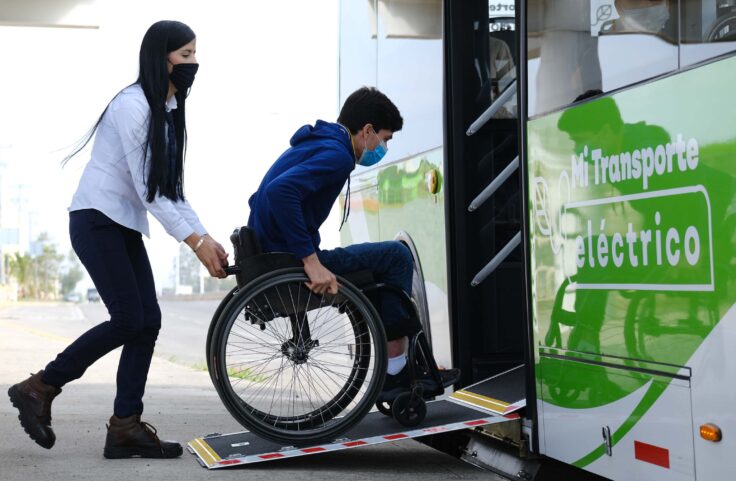
Jalisco, Mexico – 2023 STA Honorable Mention
Metropolitan Area of Guadalajara in the State of Jalisco, Mexico, and three of its municipalities — Tlaquepaque, Guadalajara and Zapopan — have been collaborating with the State Government to create a holistic mobility system known Mi Transporte. This began with the recent extension of the regional BRT system with Mi Macro Periférico, which will connect more people within and around the cities while serving thousands more riders every day. The Mi Transporte project has also emphasized affordability and accessibility in it ongoing expansion, with the provision of subsidized fares and the installation of streamlined payment collection systems with a single card for various services.
This includes Line 3 of the regional Light Rail, which has 23 kilometers connecting the municipalities of Guadalajara, Zapopan and Tlaquepaque and currently serves more than 140,000 passengers daily. Mi Transporte Eléctrico, the first all-electric bus route in the country, is now transporting more than 12,500 riders a day and helping to reduce polluting CO2 emissions by an estimated 4,000 tons of CO2 a year. Mi Macro Periférico, with its 41.5 kilometer network, is now the longest such corridor Latin America and, during the first year of service, transported between 300,000 and 350,000 users daily. Surrounding the corridor, public space improvements were also made with more lighting, safer sidewalks, new trees, and connected cycling paths.
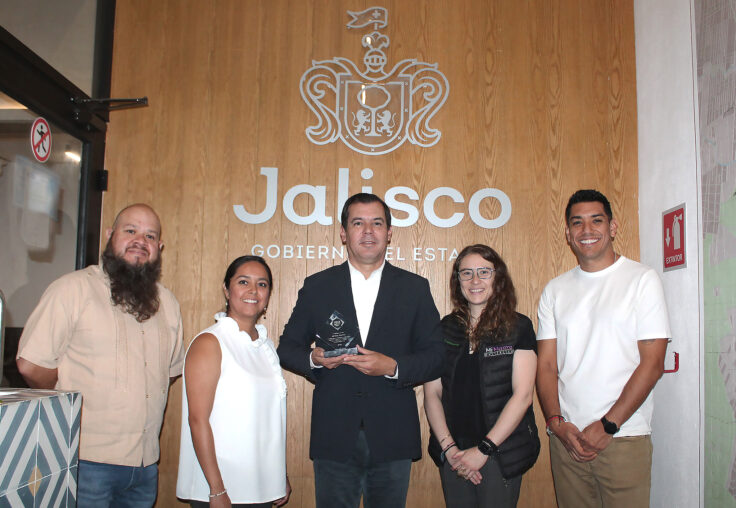
Learn more about the recent STA cities and access all of ITDP’s content on sustainable mobility on our YouTube channel here.
